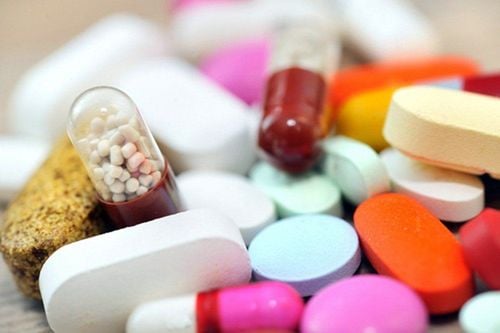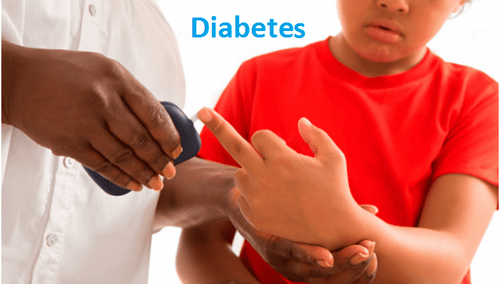This is an automatically translated article.
The article was professionally consulted with Master, Doctor Vu Quoc Anh - Pediatrician - Department of Pediatrics - Neonatology - Vinmec Danang International General Hospital.Many people think that diabetes is only seen in adults, but now there are many children suffering from this disease. In fact, type 1 diabetes in children also leaves dangerous disease complications not inferior to adults with the disease.
1. What is type 1 diabetes?
Type 1 diabetes is a common disease in children. This is a condition in which the pancreas cannot produce insulin.Insulin is a hormone needed for glucose to enter cells, which cells can use as an energy source. In our country, the rate of children with diabetes is increasing day by day and it is very difficult to treat. Accordingly, up to 90% of type 1 diabetes in children is hereditary. On the other hand, the disease is also caused by a disorder of insulin synthesis, a disorder of the place of insulin production, and is congenital in nature.
Type 2 diabetes is common in overweight and obese children. Therefore, if diabetes in children is not well controlled, it can leave dangerous complications, affecting many organs in the body not inferior to the condition in adults.

2. Common signs of type 1 diabetes in children?
Because diabetes in children is rare, it is often confused with other symptoms. In fact, children with diabetes may show 1 or 2 of the 4 typical signs. In some cases there are no specific symptoms. Therefore, parents need to pay close attention to the following symptoms to bring their children to medical centers for treatment as soon as possible, minimizing the risk of possible complications.Some common signs of type 1 diabetes in children:
2.1. Frequent thirst and frequent urination
Thirst and frequent urination are a common sign of type 1 diabetes in children. When sick, children often feel thirsty and drink a lot of water, thereby also urinating more. The cause of this condition is because the amount of sugar in the blood accumulates in such a large amount that the kidneys have to work at full capacity to filter and absorb all the excess sugar.When the kidneys work too long and are no longer able to complete this process, the excess sugar is excreted in the urine. At this time, the child's urine may appear blood and cellular fluid. Children with type 1 diabetes will drink water and urinate frequently, leading to dehydration. At that time, the child will feel thirsty and drink water often to make up for the lost water.

2.2. Feeling hungry often
Prolonged intense hunger can occur in children with type 1 diabetes. This is caused by a lack of insulin, which causes a sharp drop in blood sugar in the tissues and a lack of energy. out of hunger.2.3. Tired often
When children have type 1 diabetes, children will often feel tired, sluggish, and mentally poor. The reason is because the cells do not have access to sugar molecules to provide energy for the whole body, causing the body to be depleted of energy.
2.4. Losing weight without purpose
Due to the loss of a large source of energy that is excreted with the urine, the child will eat more to satisfy hunger, but the tissues do not receive energy from the sugar in the food. The tissues therefore need to draw energy from the previously accumulated fat tissue, causing unintentional weight loss. Therefore, parents need to be very careful because this can be a sign of diabetes in children.2.5. Blurry vision
Elevated blood sugar will draw fluid from tissues, including the vitreous tissue of the eye. So they can affect the child's ability to adjust the focus. If this condition persists, it can lead to the formation of new blood vessels in the retina and damage to the blood vessels here. In the early stages of the disease, diabetes may not affect a child's vision much, but if not diagnosed and treated early, diabetes can cause vision loss, even blindness in children.In addition to the above signs, type 1 diabetes in children also has symptoms such as convulsions, coma, lethargy, rapid breathing, infection, abdominal pain, loss of consciousness often appearing when the disease has progressed to the advanced stage. heavy section.

3. Prevention and treatment of type 1 diabetes in children
To prevent as well as minimize complications caused by diabetes in children, parents need to build a reasonable diet for their children, limit sweets or foods high in fat. , fast foods, fried foods, fatty meats, animal organs, egg yolks... Besides, it is necessary to increase the intake of green vegetables, fiber, fruits, protein, fortification. exercise, participate in fun activities, practice sports.For children with a history of diabetes, it is necessary to maintain a stricter diet and exercise regimen. However, this regimen does not mean abstaining from excessive ice cream, just choosing alternative foods for diabetics and having a reasonable nutritional regimen to ensure the development needs of the child.
Accordingly, increasing physical activity with children with diabetes is especially significant in reducing blood sugar and insulin resistance. Children with type 1 diabetes need to monitor their blood sugar regularly and maintain a stable blood sugar, periodically check the HbA1C index every 2 months, test for urine ketones to detect early complications of infection. ketoacidosis. In addition, it is necessary to pay attention to some signs of acute complications to take timely measures such as hypoglycemia with symptoms such as dizziness, lightheadedness, fatigue... At this time, it is necessary to immediately supplement for children by sucking on candies, eating cakes, drinking sugar water... and acute complications of ketoacidosis with the following manifestations: vomiting, nausea, abdominal pain, hypothermia... for timely emergency.
Diabetes is a dangerous disease and requires treatment for a long time. However, parents should not be too worried, because if type 1 diabetes in children is prevented, monitored and treated well, the child will still grow up healthy, prevent acute complications from appearing and slow down. the course of complications.

Made by a team of doctors - doctors who are leading experts in the industry , highly qualified, dedicated and wholeheartedly for the benefit of the patient. With 90% having university degrees, 20% being professors and associate professors, nearly 30% having doctorate degrees, bringing high efficiency in medical examination and treatment. Comprehensive and professional medical examination, consultation and treatment services. The system of modern equipment, supports effective diagnosis and treatment. Modern, civilized, luxurious and sterile medical examination and treatment space. Customers can choose to visit and monitor diabetes treatment at Vinmec International General Hospital.
Please dial HOTLINE for more information or register for an appointment HERE. Download MyVinmec app to make appointments faster and to manage your bookings easily.














